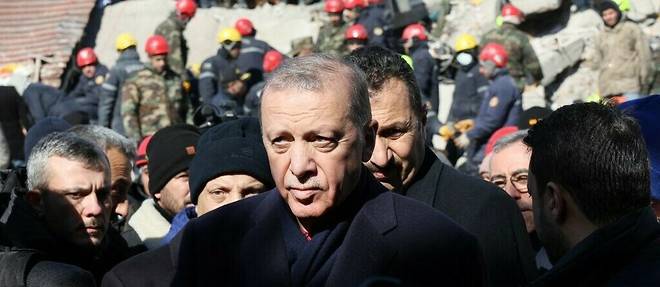While more than 15,000 people lost their lives after the violent earthquake that struck Turkey and Syria on Monday, Recep Tayyip Erdogan appears isolated.
A growing anger in Turkish public opinion. The 7.8 magnitude earthquake that devastated southern Turkey on Monday February 6 increases the pressure on Turkish President Recep Tayyip Erdogan three months before the presidential and legislative elections which already promised to be tight before the disaster. Faced with mounting criticism of the slowness and disorganization of relief, the leader in power since 2003 went to the disaster area on Wednesday and began a mea culpa.
“Of course there are shortcomings, it is impossible to be prepared for such a disaster,” he pleaded from Hatay province, near the Syrian border. The balance sheet of the earthquake which killed more than 15,000 people in total amounts to more than 12,300 dead on the Turkish side, a figure set to increase further. But even before the earth shook in the early hours of Monday, the ground was giving way under President Erdogan’s feet as he faced a series of crises ahead of the May 14 polls.
His unconventional approach to the economy sparked an inflationary spiral that saw consumer prices rise 85% last year. Sensing the danger, the president counterattacked. A few hours after the earthquake, he spoke at a press conference in Ankara – the first of a long series. On Wednesday, near the epicenter of the quake in Kahramanmaras province, he hugged a grieving woman amid the ruins. Then it descends further south towards the province of Hatay, bordering Syria, where the death toll is even higher.
Tomorrows to quit or double
Recep Tayyip Erdogan probably remembers that it was the incompetence of the authorities during the last big earthquake in Turkey, in 1999, which led his party to victory three years later. The Prime Minister at the time, Bulent Ecevit, had been the subject of strong criticism for having neglected relief to the populations.
This time, the Head of State immediately declared a maximum level of emergency calling for international assistance. Support from dozens of countries – including regional rivals – quickly poured in. For the experts, the president can therefore strengthen his position with an adjusted response. Or lose it all.
“An effective response to the emergency could strengthen the head of state and his party, the AKP, by creating a feeling of national solidarity under the leadership of Erdogan”, estimates in a note Wolfango Piccoli, from the consulting firm in political risk Teneo, based in London. “If he misses the post-earthquake response, Erdogan could lose the May elections”, nuance on the other hand Emre Caliskan, researcher at the Foreign Policy Center, based in the United Kingdom.
“Twenty years later, we are not better off”
Frustration is mounting in the affected regions. Destitute families on Tuesday denounced a government unable to come to their aid and save their loved ones trapped under the rubble. Analyst Gonul Tol, who was in Turkey at the time of the quake and who lost loved ones in the tragedy, sensed the anger was palpable in Hatay.
“I can’t believe he (Erdogan) didn’t feel it because the level of frustration, the anger, I saw it with my own eyes. I’m sure it will have an impact,” says the director of the Turkey program at the US-based Middle East Institute.
In 1999, she continues, civil society had worked tirelessly to help the victims. But this time there are fewer organizations available because Erdogan suppressed many of them following the failed coup in 2016. “Twenty years later, we are no better off,” he said. she at Agence France-Presse. “Erdogan not only weakened state institutions, he also weakened Turkish civil society. »



